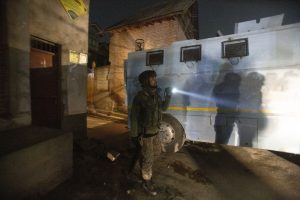On December 13, three policemen were killed and eleven others injured, when militants sprayed bullets into a bus carrying over two dozen policemen at Zewan in the outskirts of Srinagar, the summer capital of Jammu and Kashmir (J&K).
The attack, which is the first major attack on security forces since J&K’s autonomy was abrogated in August 2019, is the deadliest since the February 2019 suicide bombing of a bus carrying Central Reserve Police Force personnel at Pulwama
Monday’s attack coincided with the 20th anniversary of the 2001 attack on India’s Parliament.
A little known outfit, “Kashmir Tigers,” said to be a front organization of the Pakistan-based Jaish-e-Mohammad (JeM), is believed to have carried out the attack on the J&K policemen. Incidentally, JeM and Lashkar-e-Taiba, (LeT), groups with strong ties to Pakistan’s Inter-Services Intelligence, were behind the 2001 parliament attack as well.
Monday’s attack by the Kashmir Tigers in Srinagar has raised “serious concern” in India’s security establishment.
A highly fortified neighborhood, Zewan houses the J&K Police’s armed wing complex, the sector headquarters of the CRPF, station headquarters of the Indo-Tibetan Border Police and several armed police battalions.
Besides, security in Srinagar “was extra-tight” on December 13, a senior official of the J&K Police Force told The Diplomat, as it was the anniversary of a major terrorist attack.
In a statement claiming responsibility for the attack, the Kashmir Tigers said the “strike is a tribute to all the martyrs of Kashmir resistance.” It blamed “atrocities” committed by “the occupational regime and their stooges” for its “strike” and warned of more attacks ahead.
Kashmir Tigers is among several militant groups that emerged in the wake of the revocation of J&K’s autonomy. Unlike militant groups like Jaish-e-Mohammad, Allah Tigers and Hizbul Mujahideen which carry names that are distinctly Islamic, the post-2019 groups such as The Resistance Front, People Against Fascist Forces, United Liberation Front and the Kashmir Tigers have names with no connection to religion.
According to the police official, “the so-called new groups, are just front outfits of the LeT and JeM.” “Their secularization,” he said, is with regard “to their name only” and is aimed at giving them an image that is more political than religious.”
In October, the TRF, for instance, claimed responsibility for the killing of civilians from the Hindu and Sikh communities in Srinagar. However, it said that its targets were not chosen for their religious identity. It said that the pharmacist it had shot dead for organizing “seminars and secret meetings” of the Rashtriya Swayamsevak Sangh, an organization that propounds Hindutva ideology. The teachers were killed for forcing school children to participate in Indian Independence Day celebrations, it claimed in a statement, dismissing allegations that it was seeking to drive out religious minorities from the Muslim-dominated Kashmir.
The new groups like TRF and Kashmir Tigers were set up in the post-2019 situation in Kashmir “to show that these had emerged out of local anger with the Indian state,” the police official said. This was “to make their violence more palatable to western rights activists.”
Monday’s shooting at Zewan is the latest in a series of militant attacks and encounters that have happened in Srinagar in recent months.
In September 2020, the J&K capital was declared militancy-free. However, a year later, Srinagar has become a hub of militant activity and attacks in Kashmir.
Many of the wanted militants were captured or killed here. According to official figures, 2020 saw nine encounters between militants and security forces in Srinagar. That figure rose to 20 this year. Up to December this year, 34 people, including seven policemen and 14 militants, were killed in the city. Srinagar district saw the highest number of civilian deaths this year. Of the 10 civilians shot dead here, six were members of minority communities. Of 10 militants who figure on wanted lists since March this year, five were from Srinagar. TRF leader and recruiter Abbas Sheikh, who was operating out of Srinagar, was shot dead in the city.
The return of militancy in Srinagar is of concern especially since TRF and other groups are using easily concealable pistols to attack people.
Over the last three months, more than 3,000 additional paramilitary personnel have been deployed in Srinagar. The scene is much like the 1990s when the anti-India militancy was at its peak and Srinagar was a highly securitized city, with heavily fortified bunkers at street corners and outside buildings, and military personnel being housed in civilian buildings.
With more police deployed in Srinagar, potential targets are mushrooming. More militant attacks and encounters can be expected here.

































